|
|
|
Sort Order |
|
|
|
Items / Page
|
|
|
|
|
|
|
| Srl | Item |
| 1 |
ID:
163588
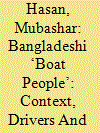

|
|
|
|
|
| Summary/Abstract |
Based on field research, this article focuses on the little-known phenomenon of Bangladeshi ‘boat people’ seeking entry to Thailand and Malaysia. It identifies how in a populous country of the Global South, familiar with various kinds of worker migration and movements of people, changing political, social and ecological contexts may generate and drive yet more manifestations of migration, also related to trafficking. In particular, certain developments in international relations connected to religious politics are shown to be instrumental in facilitating migration through legal and illegal channels. The interviews identify significant motivating factors that suggest an urgent need to develop policy recommendations, also in South Asia, to alleviate risks and suffering for irregular migrants and their families.
|
|
|
|
|
|
|
|
|
|
|
|
|
|
|
|
| 2 |
ID:
163586
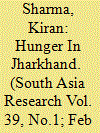

|
|
|
|
|
| Summary/Abstract |
The realities of starvation and hunger in South Asia are only partially addressed by larger discourses on food security. At the local level, many Indians continue to experience hunger, semi-starvation and malnutrition. While the age of mass starvation seems over, starvation deaths are reported from time to time, and hunger remains a lurking threat. This ethnographic study analyses patterns of poverty and food (in)security among tribal and other social groups in seven villages of the Manatu block in Palamu district of Jharkhand. The empirical findings present the main factors influencing the dynamics of household food (in)security and examine, through some case studies, how poor rural/tribal communities cope with threats of starvation and hunger. The article also critically analyses the implementation of social policies in addressing food security in Jharkhand and finds that more needs to be done to assist the most vulnerable individuals, including many women, to escape the precarities of hunger.
|
|
|
|
|
|
|
|
|
|
|
|
|
|
|
|
| 3 |
ID:
163589
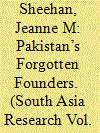

|
|
|
|
|
| Summary/Abstract |
Many nations have a short list of celebrated founders, while the contributions of many others are lost in history. An intriguing example of this narrowcasting of founders is Pakistan, where the dominant tendency has been to attribute the nation’s founding to just one man, the Quaid-i-Azam, Mohammad Ali Jinnah. The legacy of Jinnah, however, should not overshadow the contributions of his contemporaries, particularly those on the losing side of key debates or contested issues at the time. Applying lessons from research on lost founders of the USA to the case of Pakistan, this article reconceptualises what it means to be a founder. It considers why some people make the list and others do not, and then presents a case study underscoring why the words and example of one of Pakistan’s forgotten founders, Sikander Hyat-Khan, should be remembered today.
|
|
|
|
|
|
|
|
|
|
|
|
|
|
|
|
| 4 |
ID:
163585


|
|
|
|
|
| Summary/Abstract |
Rural employment generation was initiated in India through the National Rural Employment Guarantee Act (NREGA) in 2005 and related NREGS schemes, to provide better social and food security to socially and economically depressed rural workers. By now, the implementation of this scheme is known to be not equally satisfactory throughout India, with significant variations in different states and localities. This article, based on intensive fieldwork over 1 year in remote villages of Deogarh and Bhim blocks of Rajasamand district, explores the functioning of the scheme in rural Rajasthan. It identifies three important roadblocks to effective NREGA implementation and analyses their impact: persistence of caste-based inequalities and social interactions among different groups of rural people, differential occupational interests of potential workers and lack of initiative of the respective panchayats.
|
|
|
|
|
|
|
|
|
|
|
|
|
|
|
|
| 5 |
ID:
163584
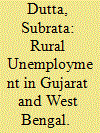

|
|
|
|
|
| Summary/Abstract |
Based on NSSO data sets, this study covers the period from 1993 to 2010 and focuses on a comparison of rural unemployment in Gujarat and West Bengal, chosen because of their contrasting characteristics. In the past few decades, Gujarat has emphasised growth through modern industrial production, while under a different ideological regime, West Bengal aimed to achieve agricultural growth, land reform and more egalitarian patterns of agricultural incomes. Recent evidence suggests that meanwhile Gujarat’s agriculture has registered high growth in output during 2000–08, while West Bengal has failed to kick off industrialisation, despite making some pressing efforts. The article clearly identifies the limited scope for agriculture to provide full employment for all young rural people in India. However, given the important role of the agricultural sector in safeguarding national food security, it becomes obvious that apart from careful attention to agricultural developments, sustainable alternatives to traditional agricultural employment need to be activated. The concluding section therefore considers various policy options for tackling the risks of rural unemployment and underemployment in India.
|
|
|
|
|
|
|
|
|
|
|
|
|
|
|
|
| 6 |
ID:
163587
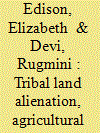

|
|
|
|
|
| Summary/Abstract |
This article, based on fieldwork, discusses the negative impacts of land alienation suffered by Adivasis in Attappady, a tribal block of Kerala in South India. Experiencing multiple alienations that have fundamentally affected their way of life, agricultural practices and food culture, tribals not only continue to suffer discriminatory treatment by non-tribal settlers, but also by state authorities’ restrictions of access to local forests and forest produce. These problems assume added significance as this ecologically important location in the Western Ghats of India is one of the eight ‘hottest hotspots’ of biological diversity in the world, while the traditional guardians of this environment have been completely disempowered. The article traces abuses of power in land alienation processes, analyses unequal power structures and argues that better appreciation of traditional tribal culture and its ecologically holistic approaches ought to inform policies for local sustainable development. This would help the tribals to safeguard their identity within the constraints of current conditions and enhance the prospects for sustainable preservation of the precious local natural resources and biodiversity.
|
|
|
|
|
|
|
|
|
|
|
|
|
|
|
|
|
|
|
|
|